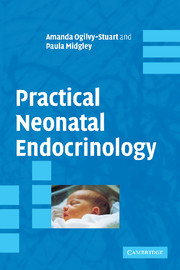Book contents
- Frontmatter
- Contents
- Acknowledgements
- Introduction
- 1 Hyperglycaemia
- 2 Hypoglycaemia
- 3 Management of hyperinsulinism
- 4 Hypoglycaemia in infant of a diabetic mother
- 5 Dysmorphic features
- 6 Micropenis
- 7 Hypopituitarism
- 8 Ambiguous genitalia (male): XY disorders of sex development
- 9 Cryptorchidism
- 10 Ambiguous genitalia (female): XX disorders of sex development
- 11 Pigmented scrotum
- 12 Adrenal failure
- 13 Collapse
- 14 Hypotension
- 15 Hyponatraemia
- 16 Hyperkalaemia
- 17 Hypernatraemia
- 18 Maternal steroid excess
- 19 Hypercalcaemia
- 20 Hypocalcaemia
- 21 Investigation and management of babies of mothers with thyroid disease
- 22 Maternal or familial thyroid disease
- 23 Goitre
- 24 Abnormal neonatal thyroid function tests
- 25 Hypothyroxinaemia in preterm infants
- Appendix 1 Calculation of glucose infusion rate
- Appendix 2 Dynamic tests
- Appendix 3 Normal ranges
- Appendix 4 Biochemistry samples
- Appendix 5 Formulary
- Index
15 - Hyponatraemia
Published online by Cambridge University Press: 15 February 2010
- Frontmatter
- Contents
- Acknowledgements
- Introduction
- 1 Hyperglycaemia
- 2 Hypoglycaemia
- 3 Management of hyperinsulinism
- 4 Hypoglycaemia in infant of a diabetic mother
- 5 Dysmorphic features
- 6 Micropenis
- 7 Hypopituitarism
- 8 Ambiguous genitalia (male): XY disorders of sex development
- 9 Cryptorchidism
- 10 Ambiguous genitalia (female): XX disorders of sex development
- 11 Pigmented scrotum
- 12 Adrenal failure
- 13 Collapse
- 14 Hypotension
- 15 Hyponatraemia
- 16 Hyperkalaemia
- 17 Hypernatraemia
- 18 Maternal steroid excess
- 19 Hypercalcaemia
- 20 Hypocalcaemia
- 21 Investigation and management of babies of mothers with thyroid disease
- 22 Maternal or familial thyroid disease
- 23 Goitre
- 24 Abnormal neonatal thyroid function tests
- 25 Hypothyroxinaemia in preterm infants
- Appendix 1 Calculation of glucose infusion rate
- Appendix 2 Dynamic tests
- Appendix 3 Normal ranges
- Appendix 4 Biochemistry samples
- Appendix 5 Formulary
- Index
Summary
Clinical presentation
Incidental finding on blood test.
Collapse (see Chapter 13).
Definition
Plasma sodium <130 mmol/L.
Approach to the problem
To distinguish between water overload (excessive intake or inadequate output) and sodium depletion (excessive salt loss).
Other features to look for:
Pigmented scrotum (see Chapter 11) or ambiguous genitalia (see Chapters 8 and 10) suggesting congenital adrenal hyperplasia.
Plasma potassium measurement.
Palpable kidney, or mass (renal vein thrombosis, adrenal haemorrhage).
Family history of renal problems.
Blood pressure (liable to be raised in renal rather than adrenal disorders).
Differential diagnosis
May be informed by consideration of:
Postnatal age (low glomerular filtration rate in the first few days of life).
Gestational age (renal immaturity resulting in salt loss).
Water overload:
latrogenic: This is the commonest cause, and may start before birth, i.e. secondary to excess maternal intravenous (IV) fluid administration.
Renal failure.
Syndrome of inappropriate antidiuretic hormone secretion (SIADH) (intracranial pathology: asphyxia, meningitis; intrathoracic pathology: pneumothorax).
Salt depletion:
Immaturity (extreme preterm infant usually from the end of first week of life).
Congenital adrenal hyperplasia (usually days 4–10).
Congenital adrenal hypoplasia.
Renal impairment, e.g. polyuric phase of acute tubular necrosis (ATN), congenital nephrotic syndrome, Bartter syndrome (hyperprostaglandin E syndrome, associated with life-threatening hypokalaemia). Congenital renal abnormality (there may be a history of polyhydramnios secondary to excessive urine output in utero).
[…]
- Type
- Chapter
- Information
- Practical Neonatal Endocrinology , pp. 99 - 104Publisher: Cambridge University PressPrint publication year: 2006

